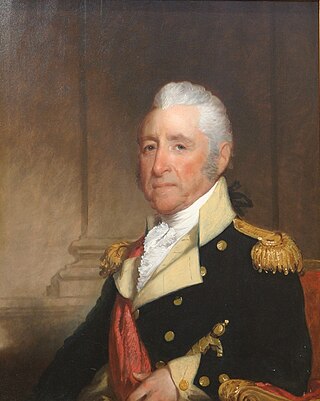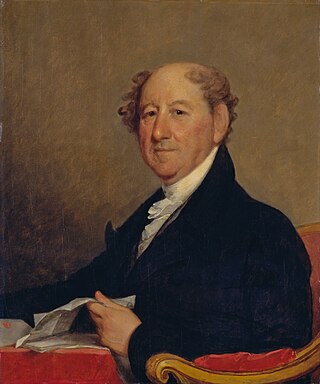
The 16th United States Congress was a meeting of the legislative branch of the United States federal government, consisting of the United States Senate and the United States House of Representatives. It met in Washington, D.C. from March 4, 1819, to March 4, 1821, during the third and fourth years of James Monroe's presidency. The apportionment of seats in the House of Representatives was based on the 1810 United States census. Both chambers had a Democratic-Republican majority.
The District of Maine was the governmental designation for what is now the U.S. state of Maine from October 25, 1780 to March 15, 1820, when it was admitted to the Union as the 23rd state. The district was a part of the Commonwealth of Massachusetts and before American independence had been part of the British province of Massachusetts Bay.
The 1820–21 United States House of Representatives elections were held on various dates in various states between July 3, 1820, and August 10, 1821. Each state set its own date for its elections to the House of Representatives before the first session of the 17th United States Congress convened on December 3, 1821. They coincided with President James Monroe winning reelection unopposed.

Ezekiel Whitman was a Representative from Maine, both when it was the District of Maine within Massachusetts and after it became an independent state. He was born in East Bridgewater in the Province of Massachusetts Bay on March 9, 1776. He graduated from Brown University in 1795. He studied law, was admitted to the bar and practiced in New Gloucester, Maine, and in Portland, Maine.
The Maine Democratic Party is the affiliate of the Democratic Party in the U.S. state of Maine.

The 1994 Maine gubernatorial election took place on November 8, 1994 to elect the governor of Maine. Incumbent Republican governor John McKernan was term-limited and could not seek re-election to a third consecutive term. Independent Angus King defeated Democratic nominee, former governor Joseph Brennan, Republican nominee Susan Collins, a regional coordinator of the Small Business Administration, and Green nominee Jonathan Carter, an environmentalist activist. Ed Finks, as a write-in candidate, received in 1.29% of the vote. This was the first election since 1974 that Maine elected an independent governor. Incidentally, both King and Collins now serve together in the United States Senate since 2013.

The 1990 Maine gubernatorial election took place on November 6, 1990 to elect the governor of Maine. Incumbent Republican governor John McKernan won re-election to a second term, defeating Democratic nominee, former governor Joseph E. Brennan in a tight contest. Independent Andrew Adam took in 9.3% of the vote. This was the last election until 2010 that Maine elected a Republican governor. This was also the last Maine gubernatorial election until 2022 in which the winner was of the same party as the incumbent president. This is also the last Maine gubernatorial election that an incumbent governor won with a smaller margin of victory in that person's re-election bid.
"As Maine goes, so goes the nation" was once a maxim in United States politics. The phrase described Maine's reputation as a bellwether state for presidential elections. Maine's September election of a governor predicted the party outcome of the November presidential election in 22 out of the 29 presidential election years from 1820 to 1932: namely 1820–1844, 1852, 1860–1880, 1888, 1896–1908 and 1920–1932; more importantly, as Maine was a generally Republican-leaning state, the margin of the September elections compared to expectations could predict national November results more than the identity of the winning party in Maine. A contest still won by the Republicans but with a narrower margin than usual would still predict good Democratic results nationally.
This was the first election in Massachusetts after the separation of the former District of Maine as the new State of Maine, taking the old 14th – 20th districts with it.
Warren H. Vinton was an American politician from Maine. Vinton represented Gray, Maine, in the Maine House of Representatives and was elected from Cumberland County to the Maine Senate in five separate elections. In 1878, Vinton was elected Senate President.

This was the first election in Maine since its separation from Massachusetts. In the previous election, Massachusetts had had 20 representatives. Seven seats were reassigned from Massachusetts to Maine. In addition, under the terms of the law which admitted Maine to the union, any vacancies in the 16th Congress by Representatives elected to represent Massachusetts but residing in the new states of Maine would be filled by a resident of Maine. John Holmes, who had been elected to the House for the former 14th district of Massachusetts was elected as one of the first two senators for Maine. The vacancy was filled in a special election by Joseph Dane (Federalist). Dane was the only Representative officially considered as representing Maine in the 16th Congress. The Representatives from the 15th-20th districts were still classified as being from Massachusetts for the remainder of the 16th Congress.
The 1833 Maine gubernatorial election took place on September 9, 1833. Incumbent Democratic Governor Samuel E. Smith was defeated for re-nomination by Robert P. Dunlap. Smith ran for re-election as an Independent Democrat.

The 1820 Massachusetts gubernatorial election was held on April 3, 1820.

The 1820 United States presidential election in Maine took place between November 1 to December 6, 1820, as part of the 1820 United States presidential election. The state's popular vote chose nine representatives, or electors to the Electoral College, who voted for President and Vice President.

The 1816 United States presidential election in Massachusetts took place between November 1 and 3, 1816, as part of the 1816 United States presidential election. The Legislature of Massachusetts chose 22 representatives, or electors to the Electoral College, who voted for President and Vice President.








